Learn English
Learn English Faster: The Brain Benefits of High-Fiber Foods
This content explores the surprising link between diet and cognitive function, specifically how consuming high-fiber foods can potentially accelerate the process of learning English. It delves into the scientific connection between dietary fiber intake and improved brain health, which is crucial for enhanced focus and memory. Understanding these benefits can offer a practical strategy for boosting brain performance essential for effective language acquisition. Therefore, incorporating high-fiber foods might be a simple way to support learning English faster by optimizing brain power.
Table of Contents
- Section 1: The Brain-Learning Connection: Why Nutrition Matters
- Section 2: Understanding High-Fiber Foods and Their General Benefits
- Section 3: How Fiber Specifically Benefits Brain Function
- Section 4: Connecting Brain Health to Faster English Learning
- Section 5: High-Fiber Foods to Include in Your Diet for Cognitive Boost
- Section 6: Integrating Nutrition and Study Habits for Optimal Results
Section 1: The Brain-Learning Connection: Why Nutrition Matters
The brain is the powerhouse of learning, and its ability to absorb and process new information, like a new language such as English, relies heavily on proper fuel. Learning involves complex processes including memory formation, concentration, and cognitive flexibility. These functions require a steady supply of nutrients, vitamins, and minerals. When your brain receives adequate and appropriate nourishment, it can create new neural pathways more efficiently, retain vocabulary and grammar rules better, and maintain focus during study sessions. Conversely, a diet lacking essential nutrients can lead to fatigue, poor concentration, and slower cognitive processing. Therefore, understanding the direct link between what you eat and your brain’s performance is the first step in leveraging nutrition to potentially accelerate your English learning journey.
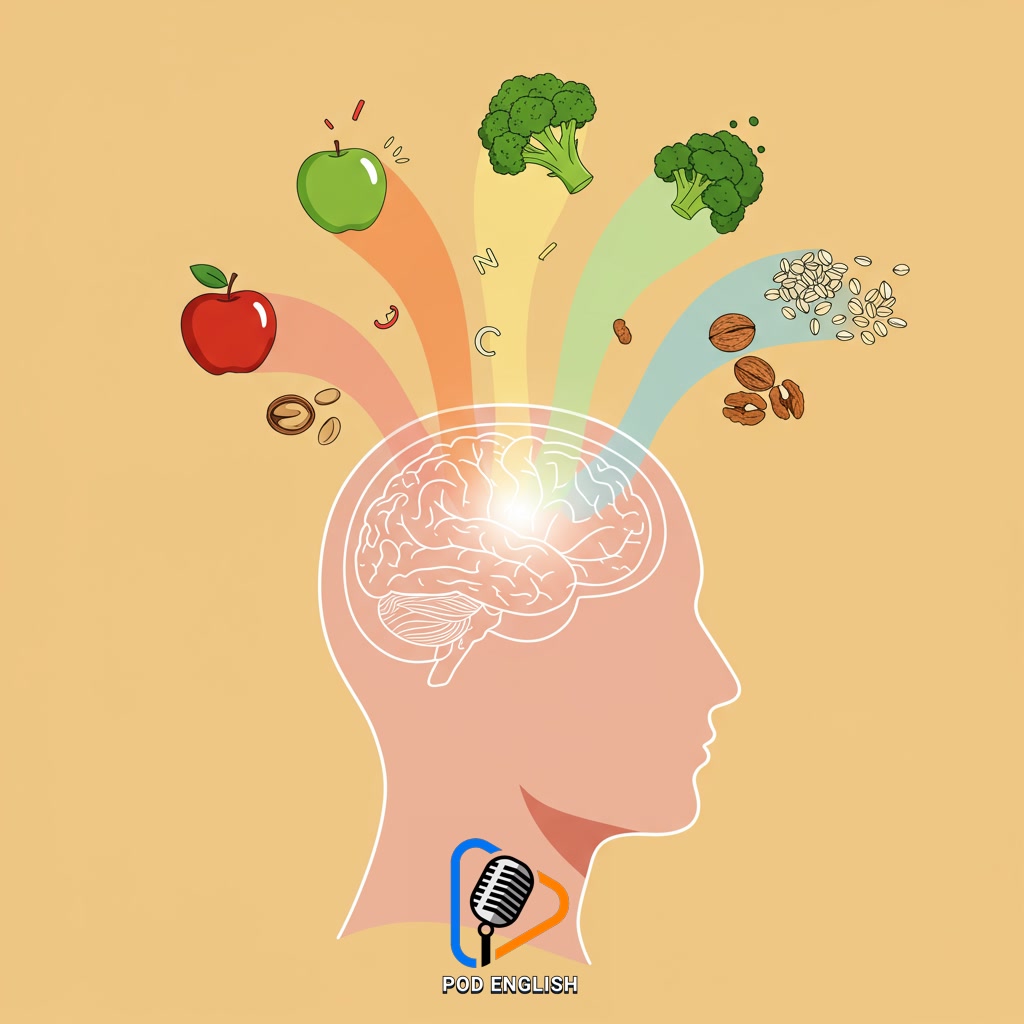
Section 2: Understanding High-Fiber Foods and Their General Benefits
Following from the understanding that the brain requires proper fuel, it’s essential to know what kind of fuel is beneficial. Dietary fiber is a type of carbohydrate found in plant foods that the body cannot fully digest. Unlike other nutrients, fiber passes relatively intact through the stomach and intestines. While it doesn’t provide energy in the traditional sense, it plays a crucial role in maintaining digestive health, promoting regular bowel movements, and helping you feel full for longer periods. Foods rich in fiber include fruits, vegetables, whole grains, legumes, nuts, and seeds. Beyond digestion, consuming adequate fiber can also help manage blood sugar levels and contribute to healthy cholesterol, laying a foundation for overall physical well-being which indirectly supports cognitive functions.
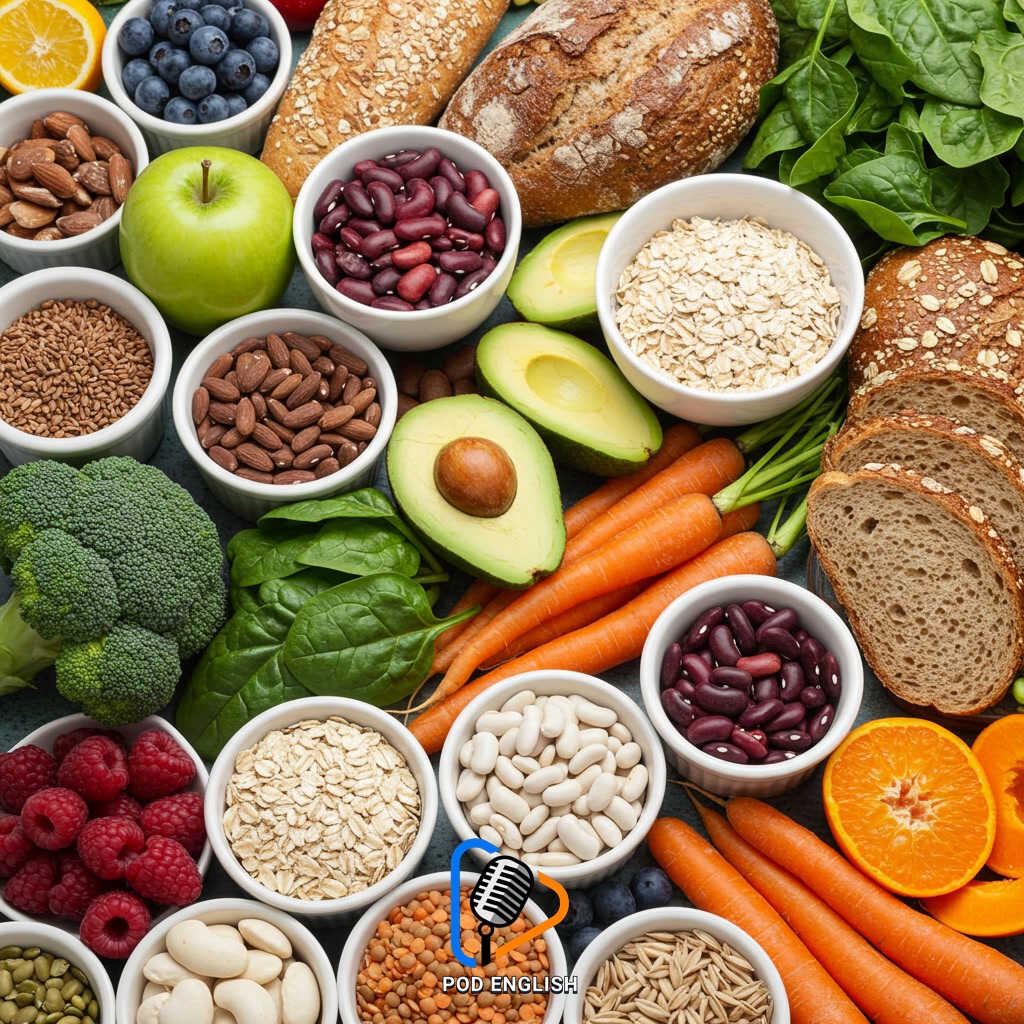
Section 3: How Fiber Specifically Benefits Brain Function
Following from the understanding that the brain requires proper fuel, it’s essential to know what kind of fuel is beneficial. Dietary fiber is a type of carbohydrate found in plant foods that the body… doesn’t fully digest. Instead, it travels to the large intestine where it’s fermented by beneficial gut bacteria. This process produces short-chain fatty acids (SCFAs), such as butyrate, which are crucial for brain health. SCFAs can cross the blood-brain barrier and have neuroprotective effects, reducing inflammation and supporting the growth of new brain cells. Improved gut health, fostered by fiber, also positively influences mood and cognitive function through the gut-brain axis. By supporting a healthy gut environment and providing these beneficial compounds, fiber intake can lead to improved focus, better memory recall, and enhanced cognitive processing – all vital components for effective language learning.
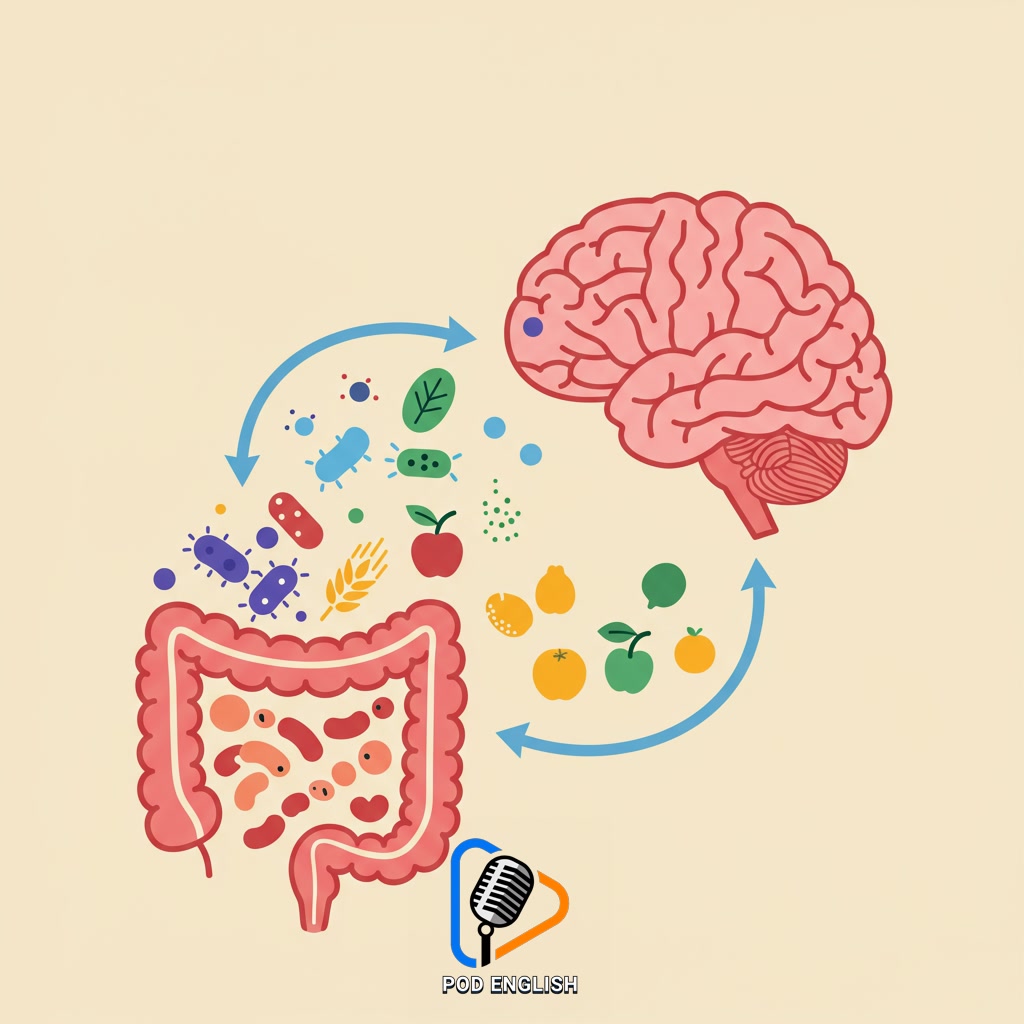
Section 4: Connecting Brain Health to Faster English Learning
Building on the idea that the brain needs good fuel, let’s explore how optimizing brain health directly supports learning English faster. A brain that is well-nourished, particularly with nutrients like those found in fiber-rich foods, functions more efficiently. This enhanced function includes improved focus, allowing you to concentrate better during lessons or study sessions. Crucially, it also boosts memory retention, which is vital for remembering new vocabulary, grammar rules, and conversational phrases. Think of it this way: a healthy, well-functioning brain is like a high-performance computer ready to process and store new information quickly and effectively. By focusing on brain health through diet, you create the optimal internal environment to absorb and utilize the English language more readily.
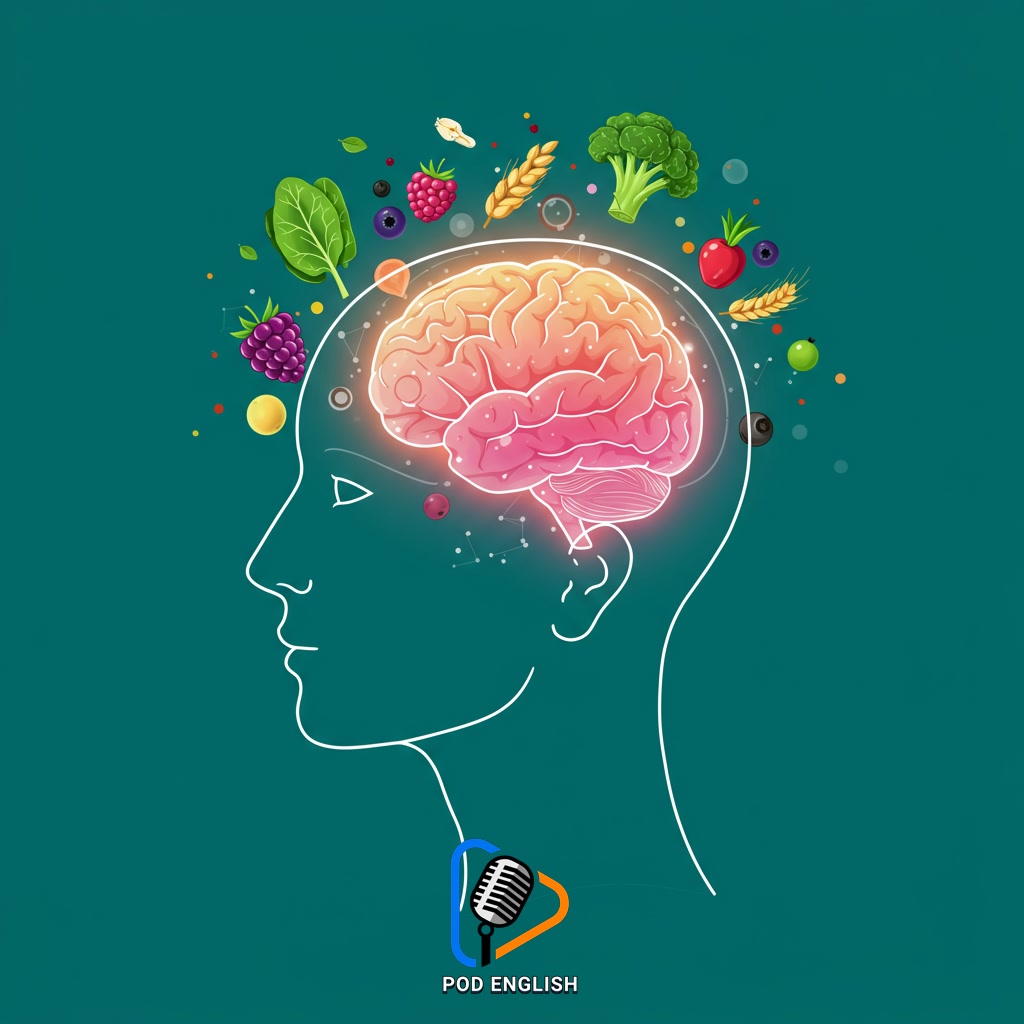
Section 5: High-Fiber Foods to Include in Your Diet for Cognitive Boost
Building on the idea that the brain needs good fuel, incorporating specific high-fiber foods can significantly boost cognitive function, directly supporting your English learning journey. Excellent sources include fruits like berries and apples, vegetables such as broccoli and spinach, legumes like lentils and beans, nuts and seeds, and whole grains like oats and quinoa. These foods provide the fiber necessary to nourish beneficial gut bacteria, which produce compounds that positively impact brain health. Furthermore, fiber helps stabilize blood sugar levels, ensuring a steady supply of energy to your brain for better focus and sustained concentration during study sessions. By reducing inflammation, these foods also protect brain cells, enhancing memory recall and cognitive flexibility – key abilities for mastering a new language.
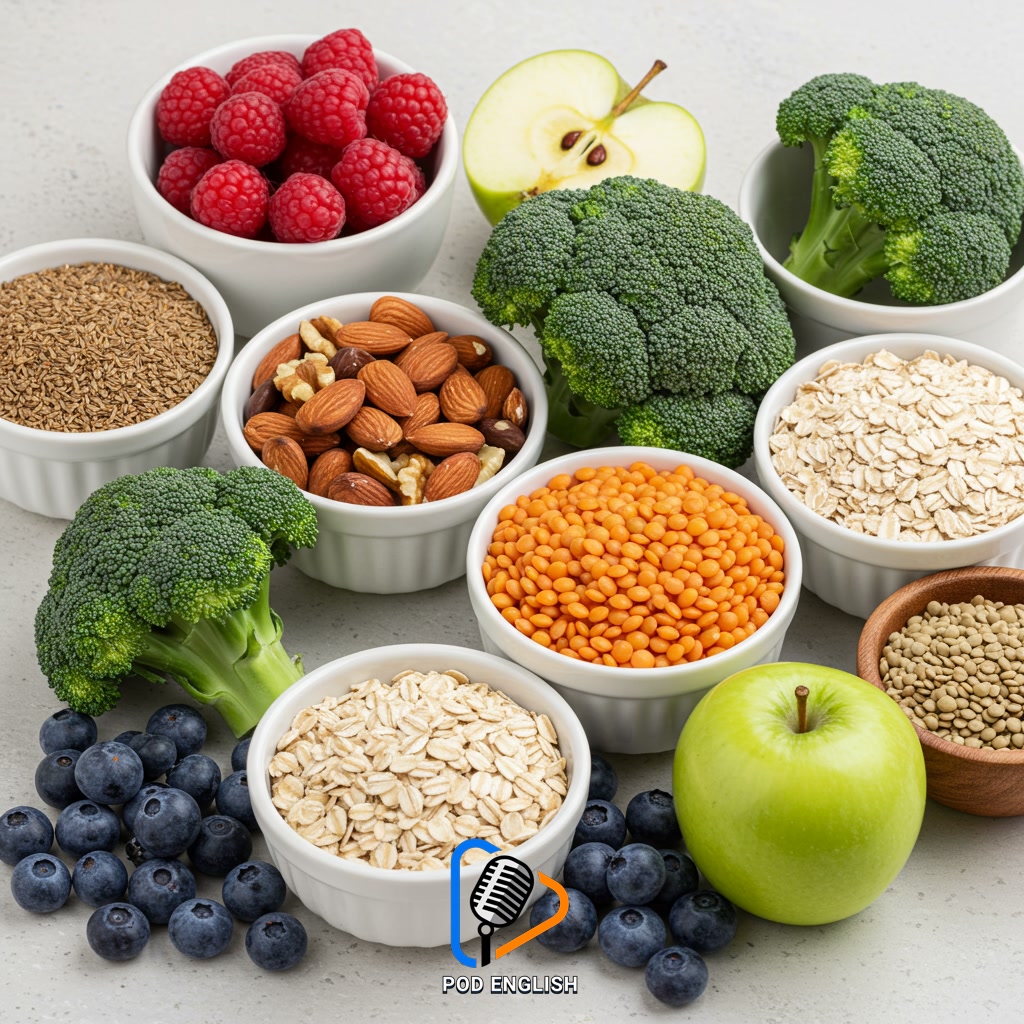
Section 6: Integrating Nutrition and Study Habits for Optimal Results
To truly maximize your English learning progress, consider how your diet, particularly high-fiber intake, can work in synergy with your study routine. It’s not enough to just study hard; your brain needs the right fuel to function optimally. Integrating high-fiber foods into your daily meals helps stabilize blood sugar, preventing energy crashes that can disrupt focus during study sessions. This steady energy supply supports sustained concentration and improved memory retention, making your study time more productive. Think of it as providing your brain with the consistent power it needs to process new vocabulary and grammar effectively. By consciously combining nutrient-rich eating habits with dedicated study time, you create an environment where your brain is best prepared to absorb and retain new information, ultimately accelerating your journey towards English fluency.














